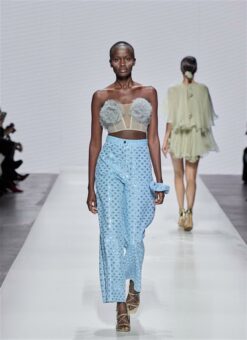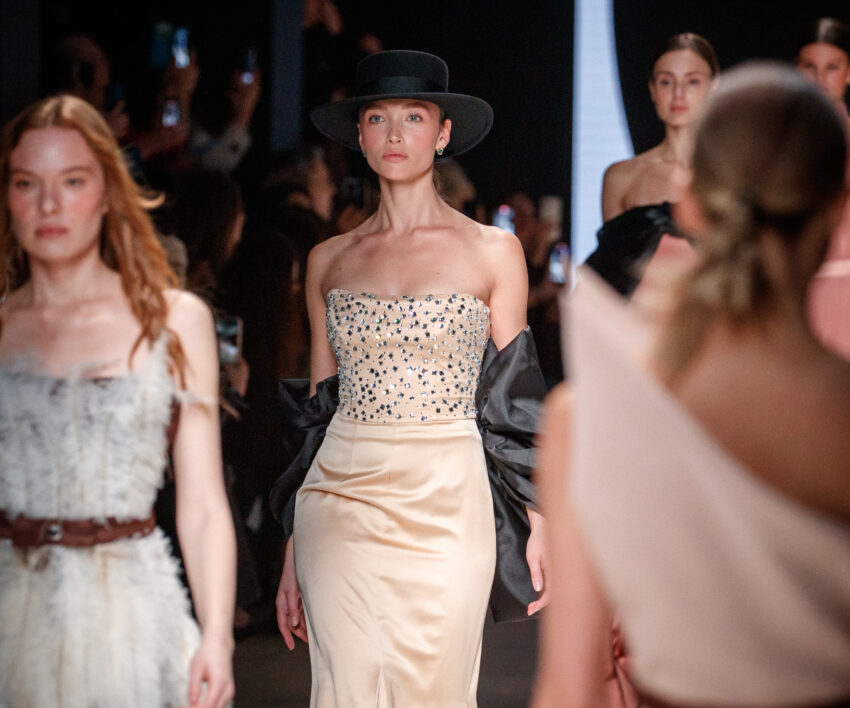Moscow Fashion Week 2024 Picture: Supplied
The BRICS+ Fashion Summit’s Business Program serves as a pioneering platform to explore the role of emerging economies in reshaping the global fashion landscape.
Gathering designers, brand executives, and policymakers from BRICS nations—Brazil, Russia, India, China, and South Africa—the summit includes public talks and panels discussing innovation, sustainability, and market expansion within the fashion industry. With the recent inclusion of several new member countries under the BRICS+ framework, the summit broadens its focus, addressing a diverse range of regional perspectives and challenges, and enriching global discourse on sustainable fashion, fair labour, and economic empowerment.
Among the prominent topics discussed during public sessions are sustainability and innovation in fashion, localization in Global Markets, and the textile revolution. Innovative fabrics on the verge of reality.
In the sustainability panel, speakers delve into challenges faced by emerging markets in adopting eco-friendly practices while maintaining profitability, sharing insights on sustainable production models that minimize waste and carbon footprint.

Kirill Chizhov, CEO and Co-founder of COPPLIFE; Cem Altan, President of the International Apparel Federation; Rita Chishti, author and entrepreneur; and Anna Zhuchenko, Senior Manager of the Production Department at Finn Flare. Maria Shevchenko, Owner of 3D COUTURE, served as the moderator for this engaging session.
The localization panel emphasizes the importance of preserving cultural heritage within the global fashion arena, highlighting how traditional craftsmanship can drive regional identity while appealing to international markets.
Tsepang David Teba, Coordinator and Head of Strategic Partnerships at Lesotho Fashion Week, noted, “What differentiates appropriation from respect is intent. Appropriation involves taking elements from another culture for personal gain without understanding, while respect entails striving to comprehend and connect with that culture.”
Zainab Saidulaeva, Chief Designer and CEO of Measure emphasized the importance of awareness among both big and local brands. She stated, “It’s crucial for us to be engaged with our cultural narratives; otherwise, we risk misrepresenting our own heritage, which can lead to misunderstandings.
“In the modern world, where distortions abound, distinguishing between the original and the imitation is vital. Coming from Dagestan, an interethnic region home to over 30 nationalities, I recognize that every embroidery and ornament carries a sacred meaning. By working with this heritage, I strive to immerse myself in the culture to avoid inappropriate use.”
Meanwhile, the textile revolution; Innovative fabrics on the verge of reality discussions focus on technology adoption, such as artificial intelligence in fashion design, e-commerce expansion, and data analytics for consumer insights, exploring how digital tools can enhance competitiveness for brands from developing nations.
This session focused on the rapid advancements in textile technologies and their implications for mass production in the fashion industry. Anna Bikchurova, a clothing materials expert and lecturer at the Fashion Factory School, said, “Currently, there are two main directions in textile development. The first focuses on enhancing human comfort. For example, there are knitwear options that incorporate aroma-filled microcapsules within the thread. When someone wearing such a T-shirt exercises, their body heat activates the microcapsules, replacing the scent of sweat with a pleasant aroma.
The summit’s importance lies in promoting a more inclusive, diverse fashion industry. BRICS+ economies represent a significant portion of the world’s population, and their unique contributions—from sustainable practices to indigenous artistry—offer new avenues for growth.
By addressing the shared challenges and opportunities within these economies, the BRICS+ Fashion Summit fosters collaboration and knowledge-sharing, driving the global industry towards a more balanced, equitable future that values cultural diversity and environmental consciousness. As a bridge between traditional practices and modern fashion, the summit helps shape a more resilient, forward-looking global fashion ecosystem.

